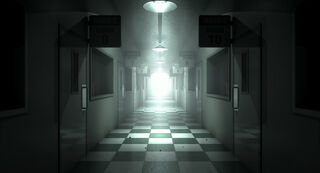The Skunk of Sherman Barracks
- David Howard
- Sep 8, 2025
- 3 min read
It was a frigid spring evening in Sherman Barracks, home to the grunts and dreamers of the 1st Battalion, 1st Regiment of the United States Corps of Cadets. The second floor, a labyrinth of Alpha Company’s quarters, hummed with the quiet tension of a Friday night. As a Third Class Cadet, I’d drawn the short straw: weekend CQ duty. A thankless task—bed checks, phone duty, package runs, the glorified errand boy for a company of would-be warriors. The only real threat was the rare specter of the Officer in Charge, prowling the halls for a surprise inspection, ready to flay any cadet caught slacking.
The CQ room was a dim refuge, its air thick with the stale scent of old coffee and the faint crackle of a radio spitting out some forgotten tune. Taps loomed thirty minutes away, the barracks settling into a deceptive calm. Most First Class Cadets were off-post, chasing liberty or liquor, while the rest lounged, slept, or vanished into the shadows of their rooms. Silence was my ally, and I savored it, a book splayed open on the desk, its pages a temporary escape from the grind.
I rose for a routine sweep of the second floor, a headcount to beat the Taps deadline. The south hallway stretched before me, lined with the closed doors of my company mates’ rooms, each a fortress of personal chaos. The north wall offered bathroom entrances and lockers, their metal glinting dully under flickering fluorescents. A plebe emerged from a bathroom, snapping to attention with a barked, “Be Straight or Be Gone, Sir!”—Alpha Company’s mantra, drilled into every freshman’s skull. I growled “Be Straight” in reflex, my boots echoing on the polished floor.
Then, movement—chaotic, unscripted. The plebe, bathrobe flapping, dove into a classmate’s room, flip-flops abandoned mid-hallway, decorum shredded. Plebes were meant to stand rigid in public spaces, not sprawl like drunken sailors. My upperclassman instincts flared, primed for a dressing-down. A Cadet Sergeant, stalking from the opposite end, saw it too. His eyes gleamed with predatory intent, but then—he froze. In a blink, he dove into the same room, door slamming shut. My stride quickened, boots pounding past rows of doors, the air suddenly heavy with an unspoken threat.
The main stairwell loomed, a concrete artery linking the barracks’ five floors and basement. Three more cadets burst from around the corner, faces pale, sprinting for their rooms like men fleeing a firing squad. A shadow followed—a small, black-and-white figure skidded into view and halted, its beady eyes locking onto mine. A skunk. The hallway became a battlefield, the air taut with unspoken challenge. A tumbleweed might’ve rolled between us, if West Point dealt in such clichés. I took a cautious step back. The skunk sniffed, its arrogance palpable, a tiny general surveying its domain. Another step, and its gaze narrowed, sizing me up. Time froze, my training useless—no gas mask, no guard book warning of this enemy. One more retreat, and the beast broke ranks, trotting toward me with deliberate menace.
I ran. Instinct trumped honor, and I dove into the nearest room, slamming the door with a thunderous crack. My heart pounded, breath ragged, as the sounds of chaos erupted outside—doors slamming, cadets shouting, the barracks a fortress under siege. We were trapped, but safe. For now.
Then, the voice I dreaded most cut through the din: “OC on the floor! Where’s the CQ?” The Officer in Charge, oblivious to the war zone, stormed the hallway. “Where the hell is everyone? Get me the damn CQ!” His boots echoed closer, a death knell. I pressed against the door, willing him to retreat. A strangled cry shattered the air, followed by a thud. Silence descended, heavy as a shroud, until a string of curses unleashed a new horror—the acrid, choking stench of skunk spray, a chemical assault that burned the lungs.
I cracked the door, peering into the carnage. The OC lay sprawled, hands clawing at his eyes, the skunk’s black-and-white tail vanishing down the stairwell like a retreating specter. I called for a medevac, barking orders as Alpha Company spilled into the courtyard, gasping for clean air. The battle was over, but the scars lingered. That night, in a second-floor hallway in upstate New York, I saw the enemy—a pint-sized demon wielding nature’s cruelest weapon. I was a changed man, forged in the crucible of that absurd defeat, thankful for the quick instincts that spared me. The skunk? It’s still out there, somewhere, a silent predator in the shadows of West Point.



Comments